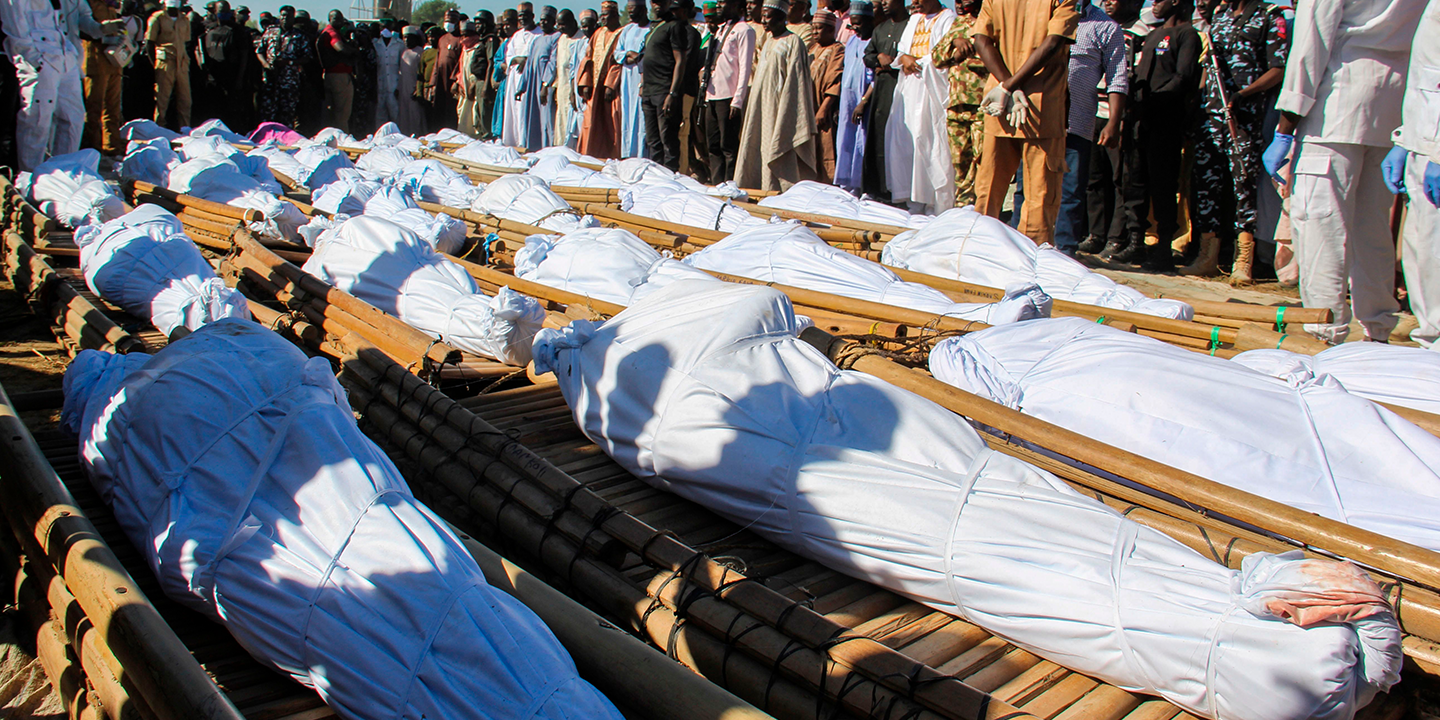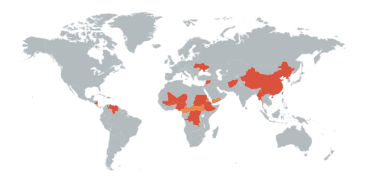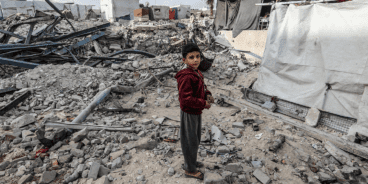

Atrocity Alert No. 231: Nigeria, Cluster Munitions and Niger
Atrocity Alert is a weekly publication by the Global Centre for the Responsibility to Protect highlighting situations where populations are at risk of, or are enduring, mass atrocity crimes.
Armed extremists kill and behead dozens of civilians in Nigeria
Last Saturday, 28 November, at least 70 civilians were killed in the village of Koshobe and other rural communities near Maiduguri, in northern Nigeria, after a group of armed men on motorcycles attacked farmers harvesting their rice fields. At least 30 of the victims were reportedly beheaded and several women were allegedly kidnapped. The armed extremist group Boko Haram has claimed responsibility for the attack, which they asserted was collective punishment for the farmers collaborating with Nigeria’s security forces.
Although the Nigerian government claims to have made progress in defeating Boko Haram, over the past year the armed extremist group has intensified their attacks in the north-east. The UN Resident and Humanitarian Coordinator in Nigeria, Edward Kallon, described the attack as “the most violent direct attack against innocent civilians this year,” and called “for the perpetrators of this heinous and senseless act to be brought to justice.”
According to the UN Office for the Coordination of Humanitarian Affairs, 35,000 people have been killed since Boko Haram launched their insurgency in 2009. As a result of insecurity caused by the group, at least 1.84 million people remain internally displaced in Borno State, where Koshobe is located.
As the Nigerian security forces struggle to address numerous security threats in the country – including increased inter-communal violence and attacks by “bandits” – President Muhammadu Buhari is facing widespread criticism over the government’s inability to adequately protect vulnerable populations. When tens of thousands of people across the country protested against poor governance and police brutality during October, security forces used deadly force against unarmed demonstrators, killing at least 12 people at Lekki Toll Gate in Lagos.
The Nigerian government should urgently address the root causes of inter-communal violence and armed extremism through socio-economic initiatives and political reforms that tackle land rights, corruption and social marginalization. The international community should continue to support Nigerian government programs aimed at strengthening local security and upholding human rights in areas where Boko Haram operate.
Syria responsible for 80% of cluster munitions casualties since 2010
Cluster munitions disperse submunitions over a wide area and leave explosive remnants, making them especially dangerous for civilians. Such weapons are inherently indiscriminate and their use is banned under international humanitarian law. Nevertheless, a decade after the Convention on Cluster Munitions entered into force in August 2010, parties to various conflicts around the world continue to use these illegal weapons to perpetrate atrocities against civilians.
The International Campaign to Ban Landmines-Cluster Munition Coalition (ICBL-CMC) released their annual Cluster Munition Monitor on 25 November, documenting how cluster munitions have been used since August 2010. Cluster munition attacks have occurred in seven states that are not signatories to the Convention: Cambodia, Libya, South Sudan, Sudan, Syria, Ukraine and Yemen.
The civilian death toll from cluster munitions and exploding remnants has been especially high in Syria, where such weapons have been utilized during that country’s devastating armed conflict. Of the 4,315 cluster munitions casualties documented by the ICBL-CMC since 2010, more than 80 percent were recorded in Syria, including 232 during 2019. There have been at least 686 cluster munitions attacks in Syria since July 2012, the majority perpetrated by government forces against their own population. Remnants of cluster munitions made in Russia, a key ally of the government, have also been documented.
Illegal cluster munitions continue to be used in heavily populated areas across Syria, including in attacks during January and February 2020 that hit three schools in Idlib province. These attacks were investigated by Human Rights Watch.
During the recent war fought between Armenia and Azerbaijan over Nagorno-Karabakh, both sides were accused of using cluster munitions in civilian areas, including in the cities of Stepanakert and Barda. Neither Armenia nor Azerbaijan are parties to the Convention on Cluster Munitions. In response to these attacks, Stephen Goose, chair of the ICBL-CMC Governance Board, said that, “cluster munitions should never be used by anyone under any circumstances, much less in cities, due to the foreseeable and unacceptable harm to civilians.”
All states that are not parties to the Convention on Cluster Munitions should ratify the convention and immediately cease the use, production, transfer and stockpiling of these illegal and indiscriminate weapons.
Niger’s army responsible for mass execution of 70 civilians
On 30 November Niger’s National Human Rights Commission, in collaboration with the Pan-African Network for Peace, Democracy and Development, released its full investigation into allegations that 102 civilians were disappeared and executed during a counter-terrorism operation conducted between 27 March and 2 April this year. The report found that elements of the Nigerien Defense and Security Forces (FDS) were responsible for the summary and extrajudicial execution of more than 70 unarmed civilians whose remains were discovered in six mass graves in Inatés, Tillabéri region, near the border with Mali and Burkina Faso. The report confirms earlier claims by human rights groups – particularly members of the People’s Coalition for the Sahel – that Sahelian governments have been complicit in atrocities and that civilians are unable to rely upon the local security forces for protection.
Violence in the areas bordering Niger, Burkina Faso and Mali has been on the rise in recent years due to arms proliferation, increased criminality, growing inter-communal tensions and weak state structures. Islamist armed groups have taken advantage of the fragile security situation to launch cross-border attacks against civilian populations as well as security forces. The FDS and other security forces, in turn, have intensified their operations against armed groups in the tri-border area.
Counter-terror operations in Mali and Burkina Faso have also led to human rights abuses perpetrated against civilians presumed to be sympathetic to Islamist armed groups. Throughout 2020 the Human Rights and Protection Division of the UN peacekeeping force in Mali has documented grave violations – including extrajudicial, summary or arbitrary executions – committed by both the Malian Defence and Security Forces and Burkinabé troops.
A climate of impunity in the Sahel has emboldened perpetrators of atrocities in the tri-border area. Justice, redress and reparations must be vigorously pursued in order to restore confidence in the security forces. Christine Caldera, Research Analyst at the Global Centre for the Responsibility to Protect has argued that, “although Nigerien forces have not committed crimes against civilians on the same scale as what we have witnessed in Burkina Faso or Mali, the operation in Inatés demonstrates an urgent need to prioritize the protection of civilians and ensure that all counter-terrorism operations strictly adhere to international humanitarian and human rights law.”
Related Content


R2P Monitor, Issue 71, 1 December 2024
